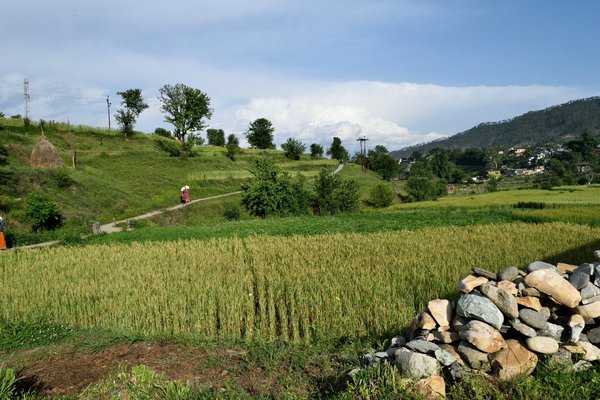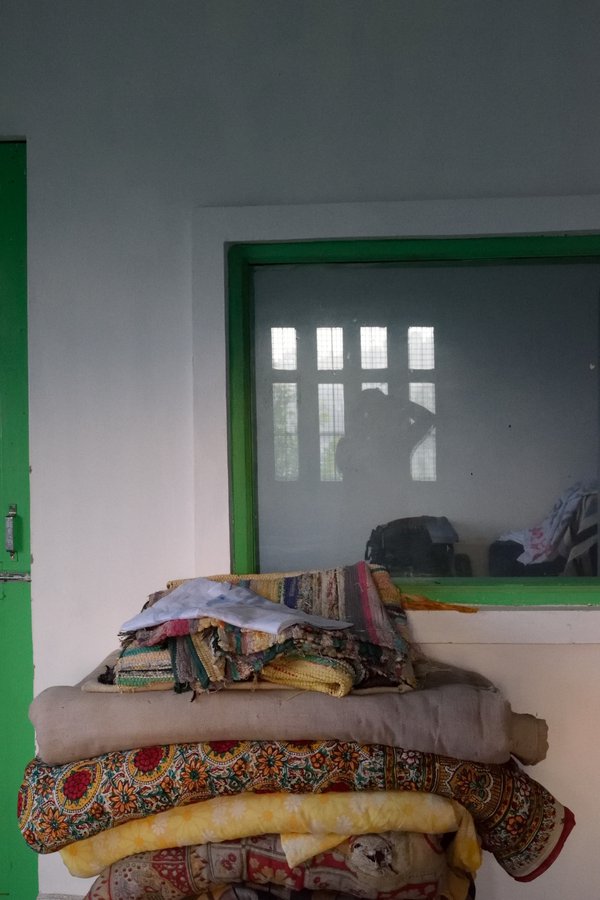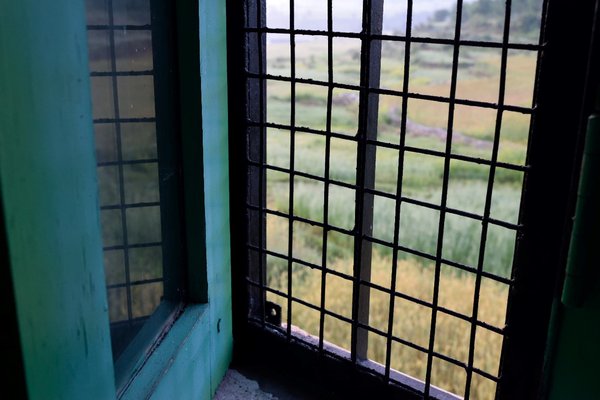
My phone’s battery weakening as I rummaged through my bag for something to cover myself with, I slipped off my mountain boots and crawled onto the mattress. There was nothing to do but go to go to bed, wondering where the stalking shadow lay that night.
I loosened my scarf from around my face exposing my forbidden short hair that had once caused my landlady to disapprovingly call out I looked like a bulbuli or little boy, and walked down the main Bageshwar market road looking for the bus stop. The familiar excitement of being away from my village field site further up in the Himalayas seeped into me. I had been living in this part of Uttarakhand for over six months, studying the many forms of wheat and rice for my doctoral dissertation. I spent most days in a rented room in a village overlooking the Parvati river. My time there had been mostly peaceful, though I craved city life and the disobedience that it allowed me. Field trips to other parts of the state where no one knew me meant that I could let my hair down – or rather leave it undone.
Sweet shops, grocery stores, banks. Restaurants that served paneer parathas. Everything glistened with the life of the urban, even if it was small town urban. After checking for directions with a few shop owners, I arrived at the bus stop and surveyed it. It was a large open space surrounded by buildings with a tea shop tucked away in a corner. Buses primed to leave as conductors hastened passengers up creaking bus stairs. The bus to Garur was to depart at 5 am, and my usual hotel was a kilometre and a half away, too far a journey for a single young woman to undertake alone on foot at 4.30 am, even in Uttarakhand. I walked back the way I came, looking for a hotel for the night. The first hotel I arrived at, Siddharth, looked seedy, but had been recommended by my colleagues. The front desk manager did not hesitate to tell me it was fully occupied, both haughty and suspicious. A young woman, in clothes that did not match her halting Hindi, and whose bearing made her inscrutable and unknown.
Angry, I turned away and headed to another hotel. Gomathi, after the river that flowed by it. There I ordered an unsatisfactory meal of parathas and barricaded myself in. All night an insistent scraping noise emerged from under the bed. Termites I tried to tell myself, before I finally fell asleep.
The next morning, I hurried through the dark and now unfamiliar street to the bus, and relaxed as it wound its way through the mountains, stopping at a restaurant that I would revisit with friends a year later for parathas and chai. In between I scuttled down a road to what should have been a public toilet but was little more than broken doors and scummy floors, anxious the bus would leave without me.
I finally arrived at the Kumaon Foundation six hours later, after tentatively walking along a canal that led from the market road through fields of wheat to the foundation’s office. I was tired, and wondered where I would sleep that night. Mr. Rawat who met me was a kindly Gandhian. Discussing recharging spring water sources and the connection between spirituality and development practice, lulled by the cool air and vistas of terraced hills outside the window, I lapsed into a feeling of security as the evening slowly rolled in.
I accepted Mr Rawat’s offer of his office to spend the night. Dumping my bags in an inner room lined with two beds, I noticed the clear glass pane ensconced in a wall that separated my room from another. The pane overlooked two forlorn computers and a few dusty books. It didn’t seem like many people came up there. The two windows that looked out into the fields from my room were covered with a close-knit mesh. I could see the Himalayas in the distance.
Downstairs I met with Mahesh and Ravi, two staffers living in the office below. Peeling carrots along with them, they told me stories of rice and wheat. As they rolled out chapattis I squirmed awkwardly in my chair, unfamiliar with the process, reminded of the old women who asked me how I would feed my future husband. Their talk turned to fieldwork, and the wildlife they encountered on their paths. A leopard that ran away with a small child in the area had been deemed a man-eater. They warned me to be careful in the night, and not wander off alone. I shivered as we went into the open courtyard to wash our hands before dinner, looking up at the narrow exposed passage that led from my room to the bathroom on the first floor. Nowhere to run if the leopard came that night.
Suddenly the lights flickered and went out. In the darkness I felt my way back to the kitchen. Ravi turned on an emergency light. In its dim glow we ate dinner, clearing away our plates and washing up quickly.
With my phone in my hand I made my way up the stairs to my room. Eyeing the passage to the bathroom, I remembered the leopard, and imagined its claws sinking into my neck. I turned away, bolting the door, both to the passage and to the room next door. My phone’s battery weakening as I rummaged through my bag for something to cover myself with, I slipped off my mountain boots and crawled onto the mattress. There was nothing to do but go to go to bed, wondering where the stalking shadow lay that night. Slowly I succumbed to sleep.
***
I jerked upright with a start, a bright light flashing off and on insistently across the room. Quiet panic bubbled up. Still slow with sleep, I looked across and saw that the light came from behind the glass pane separating my room from the next. I put on my shoes, armed with nothing, and peered across. After a few minutes realisation dawned. The electricity had come back on, and the tubelight in the next room that had probably been left on during the day was struggling to come back on fully. A loose connection alternately illuminating the yawning darkness.
My breathing slowing down, I edged towards the door, looking for a light to turn on in my own room before I entered the next one. Even after pressing the switches the room remained in still darkness. Holding my phone torch alight, I slowly unbolted the door, cautiously walking into the next room. I found the light switch and turned it off, running quickly back into my room and bolting the door.
I got under the covers and waited.
I must have drifted off into sleep, because when I woke up I felt something falling from the ceiling. An imperceptible movement, just small bits of darkness that seemed to move towards the ground. In between I heard fluttering, and movements near the ceiling.
I remembered the dream I had had as a child, when the devil himself had waited outside my parents’ bedroom window, waiting to snatch me away, and then sawing through the bedroom wall with a black crow.
I tried to hold my phone torch up to the ceiling, afraid to look. But its rays did not make their way more than halfway up the room, the low battery beeping softly of its impending betrayal.
The fluttering and the whispering darkness continued. Exhausted and almost in tears, shreds of my rational mind holding me in place, I fell asleep.
In the morning I awoke to brightness, and the chirping of birds. A little sparrow flew in through a grill, carrying a worm to its waiting babies, warm in a nest built right over the ceiling fan in the centre of the room. I looked down and saw bits of twigs on the floor that had fallen from the nest in the night. Outside the windows the wheat swayed, yellow and lazy in the brightening sunlight.
March 23rd, 2021
Natasha Susan Koshy is an academic whose primary interests lie outdoors. The fieldwork represented here was conducted for her dissertation ‘Enacting ‘Technology’ and Everything Else: Gendered Practices and the System of Crop Intensification’.

